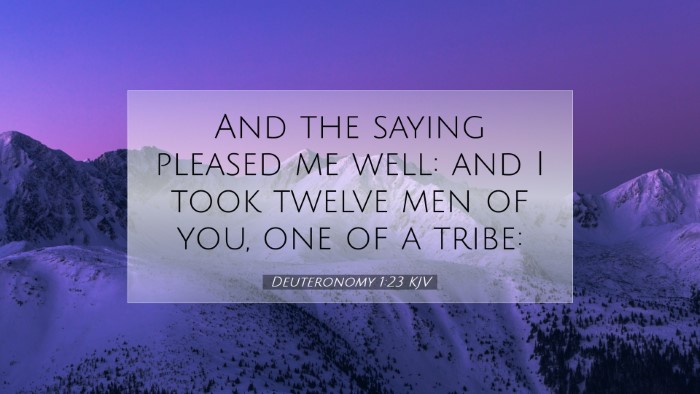Commentary on Deuteronomy 1:23
Verse: "And the saying pleased me well: and I took twelve men of you, one of a tribe:" (Deuteronomy 1:23)
Introduction
Deuteronomy 1:23 presents a pivotal moment in the narrative of Israel’s journey as it captures the leadership of Moses responding to the needs of the Israelites. This verse provides insights into themes of leadership, the importance of collective representation, and the divine orchestration of Israel's destiny. Insights from public domain commentaries such as those by Matthew Henry, Albert Barnes, and Adam Clarke will guide our understanding of the text.
Contextual Overview
In Deuteronomy, Moses gathers the people of Israel to recount their journey, reaffirm the covenant, and prepare them for entering the Promised Land. This book serves as both a reminder and a renewal of the covenant promises made by God to His people. The selection of twelve men underscores God’s intention for the nation to operate as a unified entity while respecting the diversity of tribes within it.
Commentary Insights
Moses' Leadership and Decision-Making
Moses’ willingness to delegate authority reflected his understanding of wise leadership. Albert Barnes notes that "the proposals made to Moses were not only reasonable but aligned with the needs of the people." By selecting leaders from each tribe, Moses demonstrated a commitment to inclusivity and representation. It was crucial for the Israelites to recognize that their leaders were chosen from among them, which fostered a sense of community and responsibility.
Representation of the Tribes
Matthew Henry points out that "the number twelve was significant, as it represented all the tribes of Israel, indicating that God’s plans are for the collective body of His people." Each tribe had a voice, and this act symbolized unity among diversity. The inclusion of representatives from all tribes was essential for maintaining harmony and ensuring that all voices were heard in the pursuit of taking possession of the land promised by God.
Divine Approval and Leadership
The phrase "the saying pleased me well" signifies divine approval over Moses’ decision; as Adam Clarke elaborates, it implies that "Moses’ choice was not only for the present necessity but also conformed to God’s will for the future leadership of the nation." This was not merely a human decision but one that was influenced by the divine providence guiding the Israelites through their formative years as a nation.
Lessons in Leadership
- Listening to the People: Leaders must remain responsive to the needs and suggestions of those they oversee. Moses’ action represents a model for pastoral leadership where congregational input is valued.
- Empowerment through Representation: Empowerment is achieved when diverse voices are brought into decision-making processes. Moses’ choice of twelve representatives emphasizes the strength found in diversity.
- Seeking Divine Guidance: Moses’ satisfaction with the advice signifies the need for leaders to seek divine direction in their decisions, ensuring that their plans align with God’s greater purpose.
The Role of Faith and Obedience
The selection process implied a step of faith. As they prepared to explore an unknown land, it required obedience and trust in God’s promises. Barnes notes that "the act of sending spies was an exercise of both faith and a practical step in obedience to God’s command." This act was essential as it reminded the Israelites that their journey was directed by God, and they must trust His guidance even in difficult circumstances.
Conclusion
Deuteronomy 1:23 encapsulates essential elements of leadership, representation, obedience, and faith. It shows the importance of collective decision-making and divine approval in shaping the course of a community. Through Moses’ example, we learn that leaders must be attuned to the needs of their people while being guided by God. The twelve representatives symbolize both unity and the necessary diversity within the body of believers, a principle that continues to resonate in contemporary ministry and ecclesiastical contexts.


